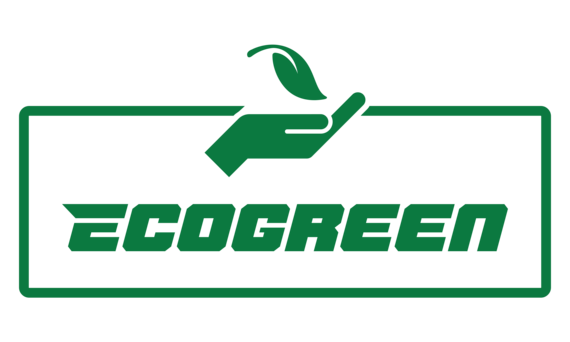
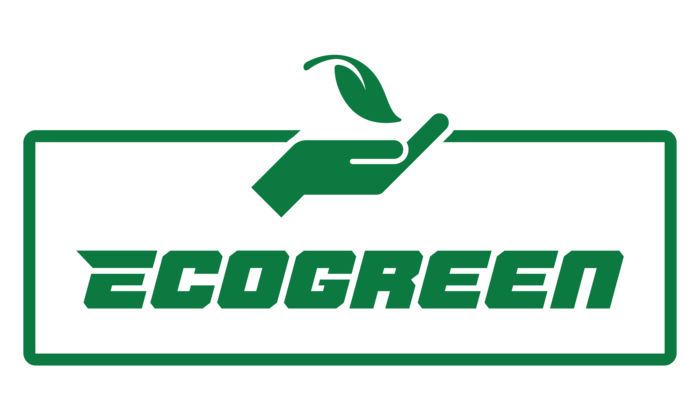
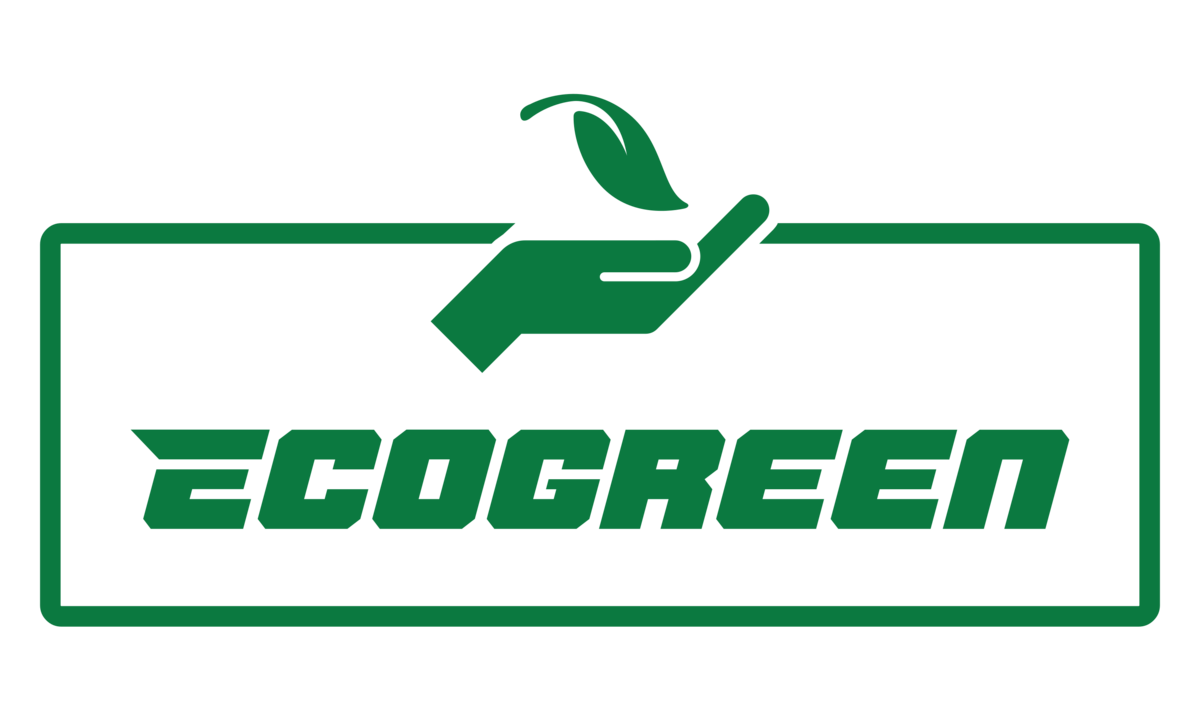
EcoGreen is a European project co-financed by the Erasmus+ programme (Strategic Partnerships in vocational education and training). Six institutions from four countries (Poland, Finland, Austria and Germany) are participating in the project.
Project Manager


30167 Hannover


Project Lead
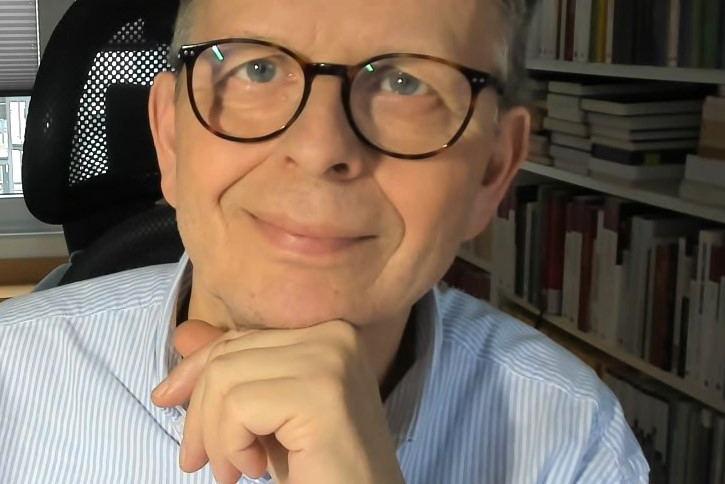
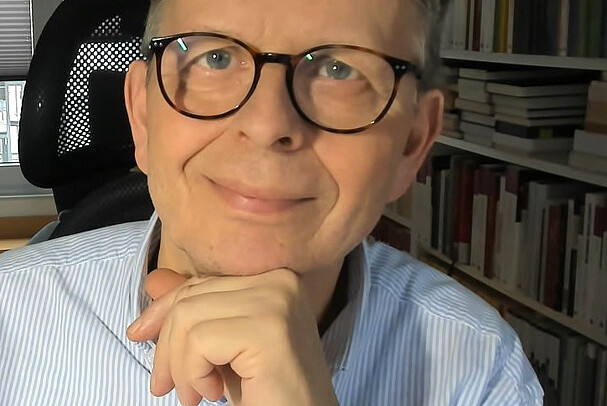
30167 Hannover


Project
Sustainability is an omnipresent topic for teachers and further training in this subject area is highly demanded. In schools, education for sustainable development is often thought of at the individual level and in this context addresses individual consumption, individual mobility and nutrition. While this is an important level of consideration, a holistic view of sustainable education must also include the system level, i.e. the level of economic policy and regulatory structures. This first step, from the micro to the macro level, is what the EcoGreen project wants to put into perspective. However, it will go one step further and expand the consideration of sustainable economic policy to include the perspective of alternative forms of economy and prosperity. We would like to enable vocational school teachers, and secondarily also vocational school students, to think in alternatives through further training in the form of critical socio-economic education; to understand economic systems as political decisions and to be able to influence them through action. Especially at vocational schools, where students are already closely linked to companies, such critical socio-economic education is indispensable. The issue of sustainability is a classic, cross-border collective goods problem, so it is imperative that the issue be addressed internationally, at least at the European level.
We want to train teachers, and secondarily also students, in the field of economic policy, sustainability and alternative economic orders and ideas of prosperity, and thus enable both teachers and students to act as critically-active subjects in the context of sustainable economic policy. In order to give them another perspective, they should not only think within the logic of the current capitalist economic order, but also find space for alternative concepts (e.g. post-growth economy or de-growth). Another goal of the project is the transnational dissemination of the project idea. Educational concepts can generally only have a pan-European impact if they are conceived internationally and can be developed transnationally.
Within the framework of the project, we carry out numerous activities. First of all, teachers are actively involved in the project at various stages in order to evaluate our results. At the same time, this step also serves to disseminate the project. In addition, a three-day learning teaching- training activity is carried out, in which teachers and members of other educational institutions receive further training on the EcoGreen project topic. In addition, the project materials are tested with at least 300 students, evaluated and improved again. All activities thus contribute not only to dissemination, but also to the constant revision and improvement of the project results.
Results
All results are closely related to each other and were developed by educational experts from theory and practice.
- Result 1 forms the didactically prepared factual basis for further training and lesson preparation for teachers.
- It is completed by Result 2, which provides concrete teaching materials to meet the teachers' need for practical materials that can be used.
- The holistic complement to these materials is the workshop and self-learning opportunity for teachers in Result 3, within which teachers are trained in critical socio-economic education.
- Result 4 is to be understood as a deepening of the in-service training, within which the teachers gain the opportunity to exchange ideas, to carry on the project idea and to promote the sustainability of the project.
You can access the EcoGreen Online Platform here.
Result 1
Result 1 comprises a handbook for teachers and podcasts from Germany, Poland, Austria, and Finland.
Handbook for Teachers
Welcome to our transformative handbook designed exclusively for educators! In the first section, explore essential background knowledge on sustainability at economic and social levels, setting the foundation for an eco-conscious classroom. Moving forward, the second section unveils didactic strategies and learning objectives tailored to the realm of vocational education. Additionally, the third section provides valuable information and guidelines for implementing the teaching units, conveniently accessible on our project’s webpage. As an added resource, don’t miss out on our blended learning course, crafted to empower teachers with in-depth insights and practical tips for seamless implementation in diverse learning settings. Let’s embark together on this journey towards sustainable education.
Podcasts Germany
-
Episode “Sustainable Education”
This podcast episode includes an interview with Michael Nagel an expert for sustainable education at the Leibniz University of Hannover.
After introducing the term “BNE” (Bildung für Nachhaltige Entwicklung – German for sustainable education) the interview provides information about the general importance of BNE and the educational contexts in which BNE can be implemented. The interview concludes with the claim by Michael Nagel that BNE should be seen as interdisciplinary and should also focus on political education to bring indivduals into the position of supporting sustainability on a structural level.
Diese Podcastfolge beinhaltet ein Interview mit Michael Nagel, Experte für nachhaltige Bildung an der Leibniz Universität Hannover.
Nach der Einführung des Begriffs „BNE“ (Bildung für Nachhaltige Entwicklung) gibt das Interview Auskunft über die allgemeine Bedeutung von BNE und die Bildungskontexte, in denen BNE umgesetzt werden kann. Das Interview endet mit der Behauptung von Michael Nagel, dass BNE als interdisziplinär verstanden werden sollte und auch einen Schwerpunkt auf politische Bildung legen sollte, um Einzelpersonen in die Lage zu versetzen, Nachhaltigkeit auf struktureller Ebene zu unterstützen.
Ten odcinek podcastu zawiera wywiad z Michaelem Nagelem, ekspertem ds. zrównoważonej edukacji na Uniwersytecie Leibniza w Hanowerze.
Po wprowadzeniu terminu „BNE” (Bildung für Nachhaltige Entwicklung – niem. dla zrównoważonej edukacji) wywiad dostarcza informacji na temat ogólnego znaczenia BNE oraz kontekstów edukacyjnych, w których BNE może być wdrażane. Wywiad kończy się stwierdzeniem Michaela Nagela, że BNE powinno być postrzegane jako interdyscyplinarne i powinno również koncentrować się na edukacji politycznej, aby doprowadzić jednostki do pozycji wspierania zrównoważonego rozwoju na poziomie strukturalnym.
Tämä podcast-jakso sisältää haastattelun Michael Nagelin kanssa, Hannoverin Leibnizin yliopiston kestävän koulutuksen asiantuntija.
Käsitteen "BNE" (Bildung für Nachhaltige Entwicklung – saksaksi kestävää koulutusta varten) esittelyn jälkeen haastattelu tarjoaa tietoa BNE:n yleisestä merkityksestä ja koulutuskonteksteista, joissa BNE:tä voidaan toteuttaa. Haastattelu päättyy Michael Nagelin väitteeseen, jonka mukaan BNE:tä tulisi nähdä poikkitieteellisenä ja sen tulisi keskittyä myös poliittiseen koulutukseen yksilöiden saattamiseksi kestävän kehityksen tukiasemaan rakenteellisella tasolla.
-
Episode "Green Cities"
This interview focuses on effects of climate change in urban environments, on the origins and costs of the damage, on solutions to lessen the damage, and macroeconomic instruments to develop cities sustainable. The interview concludes with a future vision of a green city.
Im Mittelpunkt dieses Interviews stehen die Auswirkungen des Klimawandels im städtischen Umfeld, die Ursachen und Kosten der Schäden, Lösungen zur Schadensminderung und makroökonomische Instrumente zur nachhaltigen Entwicklung von Städten. Das Interview endet mit einer Zukunftsvision einer grünen Stadt.
Wywiad ten koncentruje się na skutkach zmian klimatu w środowisku miejskim, źródłach i kosztach szkód, rozwiązaniach mających na celu zmniejszenie szkód oraz instrumentach makroekonomicznych służących zrównoważonemu rozwojowi miast. Wywiad kończy się przyszłą wizją zielonego miasta.
Tämä haastattelu keskittyy ilmastonmuutoksen vaikutuksiin kaupunkiympäristössä, vahinkojen alkuperään ja kustannuksiin, ratkaisuihin vahinkojen vähentämiseksi sekä makrotaloudellisiin välineisiin kaupunkien kehittämiseksi kestäviksi. Haastattelu päättyy tulevaisuuden visioon vihreästä kaupungista.
Podcasts Poland
-
Episode "Ecofriendly Tourism"
Interview 1 - with the director of the Mona Lisa Hotel, mgr Ryszard Woźniak, Member of the Board of the Regional Association of Tourism and Spa on eco-friendly hotels, the necessity to respond to the new expectations of the customers in the field of environmental awareness campaigns, lack of the role models for pro-ecological solutions in Kołobrzeg's area and plans for the future.
Haastattelu 1 - Mona Lisa -hotellin johtajan Ryszard Woźniakin, matkailu- ja kylpyläliiton hallituksen jäsenen ympäristöystävällisistä hotelleista, tarpeesta vastata asiakkaiden uusiin ympäristö-odotuksiin tiedotuskampanjat, roolimallien puute ekologisia ratkaisuja varten Kołobrzegin alueella ja tulevaisuuden suunnitelmat.
Wywiad 1 - z dyrektorem Hotelu Mona Lisa, mgr Ryszardem Woźniakiem, Członkiem Zarządu Regionalnego Stowarzyszenia Turystyki i Uzdrowisk o hotelach ekologicznych, o konieczności reagowania na nowe oczekiwania klientów w zakresie ochrony środowiska kampanie uświadamiające, brak wzorców rozwiązań proekologicznych na terenie Kołobrzegu i plany na przyszłość.
Interview 1 – mit dem Direktor des Mona Lisa Hotels, Mgr. Ryszard Woźniak, Vorstandsmitglied des Regionalverbandes für Tourismus und Spa, über umweltfreundliche Hotels und die Notwendigkeit, auf die neuen Erwartungen der Kunden im Bereich Umwelt zu reagieren Sensibilisierungskampagnen, Mangel an Vorbildern für pro-ökologische Lösungen in der Region Kołobrzeg und Pläne für die Zukunft.
-
Episode "Smart City"
Interview 2 - with the President of the Kołobrzeg, mgr Anna Mieczkowska, on the concept of SMART CITY, the town's plans for integrating pro-ecological solutions into the town's infrastructure (rain gardens, eco-friendly playgrounds,), ways to incorporate town inhabitants' needs and expectations toward the sustainable living environment into the town's budget planning and practices to make them actively participate in the town's development.
Haastattelu 2 - Kołobrzegin presidentin, valtuutetun Anna Mieczkowskan kanssa SMART CITY -konseptista, kaupungin suunnitelmista ekologisten ratkaisujen integroimiseksi kaupungin infrastruktuuriin (sadepuutarhat, ympäristöystävälliset leikkikentät), tavoista sisällyttää kaupungin asukkaat ' kestävää elinympäristöä koskevat tarpeet ja odotukset osaksi kaupungin budjettisuunnittelua ja käytäntöjä, jotta ne osallistuvat aktiivisesti kaupungin kehittämiseen.
Wywiad 2 - z Prezydentem Miasta Kołobrzegu, mgr Anną Mieczkowską, na temat koncepcji SMART CITY, planów miasta w zakresie integracji rozwiązań proekologicznych z infrastrukturą miejską (ogrody deszczowe, ekologiczne place zabaw), sposobów włączania mieszkańców miasta potrzeby i oczekiwania dotyczące zrównoważonego środowiska życia w planowaniu i praktykach budżetowych miasta, aby aktywnie uczestniczyły w rozwoju miasta.
Interview 2 – mit der Präsidentin von Kołobrzeg, Mgr. Anna Mieczkowska, über das Konzept der SMART CITY, die Pläne der Stadt zur Integration pro-ökologischer Lösungen in die Infrastruktur der Stadt (Regengärten, umweltfreundliche Spielplätze) und Möglichkeiten zur Einbindung der Stadtbewohner Bedürfnisse und Erwartungen an ein nachhaltiges Lebensumfeld in die Haushaltsplanung und -praxis der Stadt einzubeziehen, um sie aktiv an der Entwicklung der Stadt zu beteiligen.
-
Episode "Kołobrzeg Port"
Interview 3 - with Mr Artur Lijewski, Chairman of the Board of the Kołobrzeg Port on the pro-ecological activities implemented by the port in the field of ecology (installing sea waste bins, collecting all fishermen nets) and its future plans as the hub for servicing boats operating the windmill farms on the sea.
Haastattelu 3 - Kołobrzegin sataman hallituksen puheenjohtajan Artur Lijewskin kanssa sataman toteuttamista proekologisista toimista ekologian alalla (meren jäteastioiden asentaminen, kaikkien kalastajien verkkojen kerääminen) ja sen tulevaisuuden suunnitelmista sataman keskuksena. tuulimyllytiloilla toimivia veneitä merellä.
Wywiad 3 - z Panem Arturem Lijewskim, Prezesem Zarządu Portu Kołobrzeg na temat proekologicznych działań portu w zakresie ekologii (montaż kontenerów na odpady morskie, zbieranie wszystkich sieci rybackich) oraz jego planów na przyszłość jako centrum obsługa łodzi obsługujących farmy wiatraków na morzu.
Interview 3 – mit Herrn Artur Lijewski, Vorstandsvorsitzender des Hafens Kołobrzeg, über die pro-ökologischen Aktivitäten des Hafens im Bereich Ökologie (Installation von Meeresabfallbehältern, Einsammeln aller Fischernetze) und seine Zukunftspläne als Drehscheibe für Wartung von Booten, die die Windmühlenparks auf dem Meer betreiben.
-
Episode "Environmental Protection in Kolobrzeg"
Interview 4 - with the Department of Green and Environmental Protection head in the Community of Kolobrzeg - on the ecological threats and resources Community uses to mitigate them, tools and mechanisms used by the local authorities to monitor water, ground and air positions, obstacles in forcing the changes onto the environmental protection' offenders and ways to overcome it by educating the society.
Haastattelu 4 - Vihreä- ja ympäristönsuojeluosaston päällikön kanssa Kolobrzegin yhteisössä - ekologisista uhista ja luonnonvaroista, joita yhteisö käyttää niiden lieventämiseen, paikallisten viranomaisten käyttämistä työkaluista ja mekanismeista veden, maan ja ilman aseman tarkkailuun, pakottamisen esteistä muutokset ympäristönsuojelurikkomuksiin ja tapoja voittaa se yhteiskuntaa kouluttamalla.
Wywiad 4 - z Naczelnikiem Wydziału Zieleni i Ochrony Środowiska Gminy Kołobrzeg - na temat zagrożeń ekologicznych i zasobów wykorzystywanych przez gminę do ich łagodzenia, narzędzi i mechanizmów stosowanych przez władze samorządowe do monitoringu pozycji wód, gruntów i powietrza, przeszkód w wymuszaniu zmiany na przestępców ochrony środowiska i sposoby ich przezwyciężania poprzez edukację społeczeństwa.
Interview 4 – mit dem Leiter der Abteilung für Grün- und Umweltschutz in der Gemeinde Kolobrzeg – über die ökologischen Bedrohungen und die Ressourcen, die die Gemeinschaft zu deren Eindämmung einsetzt, über Instrumente und Mechanismen, die von den lokalen Behörden zur Überwachung von Wasser-, Boden- und Luftpositionen eingesetzt werden, und über Hindernisse beim Treiben die Veränderungen bei den Umweltsündern und Möglichkeiten, diese durch Aufklärung der Gesellschaft zu überwinden.
Podcasts Austria
-
Episode "Imperial Lifestyle"
About the interviewee:
Ulrich Brand is professor of international politics and head of the Political Science Department at the University of Vienna. He is also the director of the Research Network Latin America.
About the episode:
Ulrich Brand discusses the paradigm of economic growth and how “multiple crises” are produced and stabilized with the means of the “imperial lifestyle”, a term coined by him and his research partner, Markus Wissen. Furthermore, he reflects on a society that is based on solidarity rather exploitation and highlights the important role VET schools and teachers play in achieving this goal.
Über den Interviewpartner:
Ulrich Brand ist Professor für Internationale Politik und Leiter des Instituts für Politikwissenschaft an der Universität Wien. Er ist außerdem Direktor des Forschungsnetzwerks Lateinamerika.
Über die Folge:
Ulrich Brand diskutiert das Paradigma des Wirtschaftswachstums und wie mit den Mitteln des von ihm und seinem Forschungspartner Markus Wissen geprägten „imperialen Lebensweise“ „multiple Krisen“ erzeugt und stabilisiert werden. Darüber hinaus denkt er über eine Gesellschaft nach, die auf Solidarität statt auf Ausbeutung basiert, und hebt die wichtige Rolle berufsbildender Schulen und Lehrer bei der Erreichung dieses Ziels hervor.
O rozmówcy:
Ulrich Brand jest profesorem polityki międzynarodowej i kierownikiem Wydziału Nauk Politycznych na Uniwersytecie Wiedeńskim. Jest także dyrektorem Research Network Latin America.
O odcinku:
Ulrich Brand omawia paradygmat wzrostu gospodarczego oraz sposób, w jaki „wielokrotne kryzysy” są wytwarzane i stabilizowane za pomocą „imperialnego stylu życia”, termin ukuty przez niego i jego partnera badawczego, Markusa Wissena. Ponadto zastanawia się nad społeczeństwem opartym na solidarności, a nie na wyzysku i podkreśla ważną rolę, jaką odgrywają szkoły VET i nauczyciele w osiągnięciu tego celu.
Tietoja haastateltavasta:
Ulrich Brand on kansainvälisen politiikan professori ja valtiotieteen laitoksen johtaja Wienin yliopistossa. Hän on myös Latinalaisen Amerikan tutkimusverkoston johtaja.
Tietoja jaksosta:
Ulrich Brand keskustelee talouskasvun paradigmasta ja siitä, kuinka "moninkertaiset kriisit" syntyvät ja vakautetaan "keisarillisen elämäntavan" keinoin, jonka hän ja hänen tutkimuskumppaninsa Markus Wissen keksivät. Lisäksi hän pohtii yhteiskuntaa, joka perustuu solidaarisuuteen pikemminkin hyväksikäyttöön ja korostaa ammatillisten koulujen ja opettajien tärkeää roolia tämän tavoitteen saavuttamisessa.
-
Episode "Anthropocene"
About the interviewee:
Daniel Buschmann is a researcher at the Environment Agency Austria at the Department of Climate Change Adaptation & Resilience, and at the Institute of Philosophy at the Slovak Academy of Sciences. His area of expertise is are the multi-level governance of adaptation policies, and political environmental philosophy and in the Anthropocene.
About the episode:
In this episode, Daniel Buschmann explains the term Anthropocene, highlighting the problems surrounding its debate. Furthermore, he underlines the role VET teachers play to tackle the issues of climate crises.
Über den Interviewpartner:
Daniel Buschmann ist wissenschaftlicher Mitarbeiter am Umweltbundesamt Österreich in der Abteilung für Anpassung an den Klimawandel und Resilienz sowie am Institut für Philosophie der Slowakischen Akademie der Wissenschaften. Sein Fachgebiet ist die Multi-Level-Governance von Anpassungspolitiken sowie die politische Umweltphilosophie und das Anthropozän.
Über die Folge:
In dieser Folge erklärt Daniel Buschmann den Begriff Anthropozän und beleuchtet die Probleme, die mit seiner Debatte verbunden sind. Darüber hinaus unterstreicht er die Rolle, die Berufsbildungslehrer bei der Bewältigung der Probleme von Klimakrisen spielen.
O rozmówcy:
Daniel Buschmann jest pracownikiem naukowym Austriackiej Agencji Środowiska w Departamencie Adaptacji i Odporności na Zmiany Klimatu oraz w Instytucie Filozofii Słowackiej Akademii Nauk. Jego obszarem specjalizacji jest wielopoziomowe zarządzanie politykami adaptacyjnymi oraz polityczna filozofia środowiska i antropocenu.
O odcinku:
W tym odcinku Daniel Buschmann wyjaśnia pojęcie antropocenu, podkreślając problemy związane z jego debatą. Ponadto podkreśla rolę, jaką odgrywają nauczyciele kształcenia i szkolenia zawodowego w rozwiązywaniu problemów związanych z kryzysami klimatycznymi.
Tietoja haastateltavasta:
Daniel Buschmann on tutkija Itävallan ympäristökeskuksessa ilmastonmuutokseen sopeutumisen ja kestävyyden osastolla ja Slovakian tiedeakatemian filosofian instituutissa. Hänen asiantuntemuksensa ovat sopeutumispolitiikan monitasoinen hallinto, poliittinen ympäristöfilosofia ja antroposeeni.
Tietoja jaksosta:
Tässä jaksossa Daniel Buschmann selittää termin antroposeeni ja korostaa sen keskusteluun liittyviä ongelmia. Lisäksi hän korostaa ammatillisen koulutuksen opettajien roolia ilmastokriisien ongelmien ratkaisemisessa.
Podcasts Finland
-
Episode "Sustainable Forestry"
About the interviewee:
Hanne Liukko is a teacher of forestry in the vocational college Samiedu in Savonlinna, Finland. She is experienced in the field to educate the private forests owners in Finland and is also a forest owner.
About the interviewer:
Anne-Mari Behm is a private forest owner and specialist in internationalization in vocational education.
About the episode:
The main theme of the episode is sustainable forestry in Finland: the principles, legislation, certificates.
Jakson pääteema on kestävä metsätalous Suomessa: periaatteet, lainsäädäntö, sertifikaatit.
Tematem przewodnim odcinka jest zrównoważone leśnictwo w Finlandii: zasady, ustawodawstwo, certyfikaty.
Das Hauptthema der Folge ist die nachhaltige Forstwirtschaft in Finnland: die Grundsätze, Gesetze, Zertifikate.
-
Episode "Sustainability for private forest owners"
About the interviewee:
Hanne Liukko is a teacher of forestry in the vocational college Samiedu in Savonlinna, Finland. She is experienced in the field to educate the private forests owners in Finland and is also a forest owner.
About the interviewer:
Anne-Mari Behm is a private forest owner and specialist in internationalization in vocational education.
About the episode:
In this episode is discussed what sustainability means for the private forest owners in Finland.
Tässä jaksossa keskustellaan siitä, mitä kestävä kehitys tarkoittaa yksityisille metsänomistajille Suomessa.
W tym odcinku omówiono, co zrównoważony rozwój oznacza dla prywatnych właścicieli lasów w Finlandii.
In dieser Folge wird diskutiert, was Nachhaltigkeit für die privaten Waldbesitzer in Finnland bedeutet.
Result 2
Result 2 comprises a great selection of teaching materials as well as additional materials.
SUSTAINABLE DEVELOPMENT GOAL 8 VS SUSTAINABILITY
In this unit, students will explore the link between economy and sustainability, focusing on Sustainable Development Goal 8. They’ll critique SDG8’s alignment with sustainable development principles and examine the tension between economic growth and sustainability. Key concepts will be defined, and a scenario will challenge students to consider the consequences of prioritizing economic growth over sustainability. Students will research experts’ criticisms of SDG8, analyze the negative impacts of economic growth on the environment, society, and future generations, and explore alternative economic development approaches. By the unit’s end, students will understand the complex relationship between economy and sustainability, analyze different perspectives, and propose solutions that balance economic growth and sustainable development. This unit aims to enhance critical thinking and prepare students to contribute as responsible global citizens.
Materials included in this learning unit:
- introductory video
- lesson plan
- presentation of the learning unit for teachers
- guiding document
Green and sustainable cities
In this immersive module, we embark on a journey to explore the dynamic and evolving concept of green cities. As urbanization accelerates and environmental concerns take centre stage, the need for sustainable and eco-friendly urban spaces has become paramount. This learning unit is designed to unravel the principles, innovations, and challenges associated with creating and maintaining green cities.
Throughout this unit, we will delve into the multifaceted dimensions of green urbanism, where environmental sustainability converges with urban development. From innovative architectural designs to eco-conscious urban planning, we will examine the strategies employed to transform cities into thriving, resilient, and environmentally responsible communities.
Materials included in this learning unit
- information about the learning situation
- guidelines for implementation
- a glossary and worksheets
Future frequencies
In this innovative and forward-thinking module, we embark on a transformative exploration of the Future Frequencies Method – a cutting-edge approach designed to decode the intricacies of emerging technologies, connectivity, and the transformative impact they hold for the future. This learning unit is crafted to equip you with the tools, insights, and methodologies to navigate the dynamic new teaching method and think about how to mitigate the dangers hiding in the unknown future.
Materials included in this learning unit:
- lesson plan
- manual for learners
Sustainable Forestry
In this enlightening module, we embark on a journey into the heart of sustainable forestry – a crucial endeavour in our collective pursuit of balancing environmental conservation with the responsible management of our precious forest resources. This learning unit is designed to unravel the principles, practices, and innovations that define sustainable forestry, equipping you with the knowledge and skills to become stewards of our forests for future generations.
Materials included in this learning unit:
- lesson plan
- manual for learners
Green Entrepreneurship
Welcome to the Green Entrepreneurship Learning Unit!
In this dynamic and innovative learning journey, you are about to embark on a transformative experience that will empower you to create your own green business. Throughout this unit, you will engage in a series of tasks and activities carefully designed to instil the knowledge, skills, and mindset needed to launch a successful and sustainable venture in green business.
Materials included in this learning unit:
- lesson plan
- presentation of the learning unit for teachers
- activities for learners
Best Practices in Green Economy, Sustainable Development, and Alternative Forms of Economy in Europe
Welcome to the section dedicated to best practices in green economy, sustainable development, and alternative forms of economy in Europe. These additional educational materials are designed for teachers and trainers from vocational schools to support them in educating future sustainable development leaders. You will find inspiring examples, innovative projects, and practical solutions implemented in various European countries, which will help integrate ecological and socially responsible practices into everyday teaching.
Materials included in this learning unit:
- best practices examples in Austria
- best practices example in Finland
- best practices example in Germany
- best practices example in Poland
- “Level Green” game
Online course
Embark on a transformative journey with our online course tailored for educators, where dynamic content and interactive modules empower teachers to master the intricacies of green economy integration in vocational education, paving the way for a sustainable future in the classroom. You find the course here.
Promotion Material
News & Events
Project Meeting in Brunswick
The final meeting of the EcoGreen project took place in Brunswick from June 4 to 6. Together with our partners, we made final arrangements, reviewed the collaboration and held a multiplyer event with the students of the Studienseminar Braunschweig. Thank you to our Partner Studienseminar Braunschweig for your hospitality!
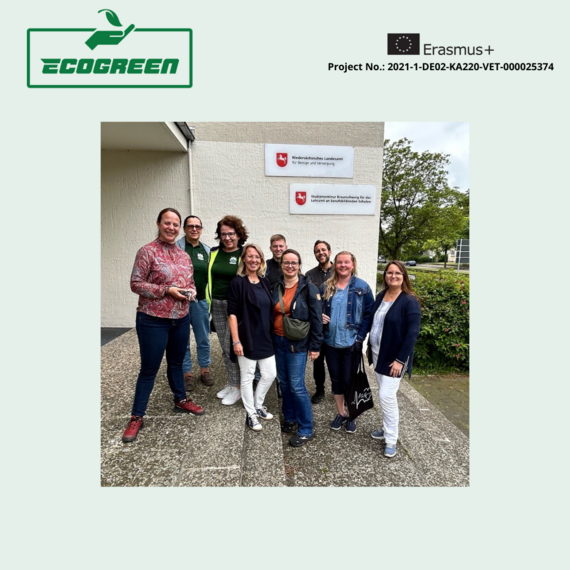
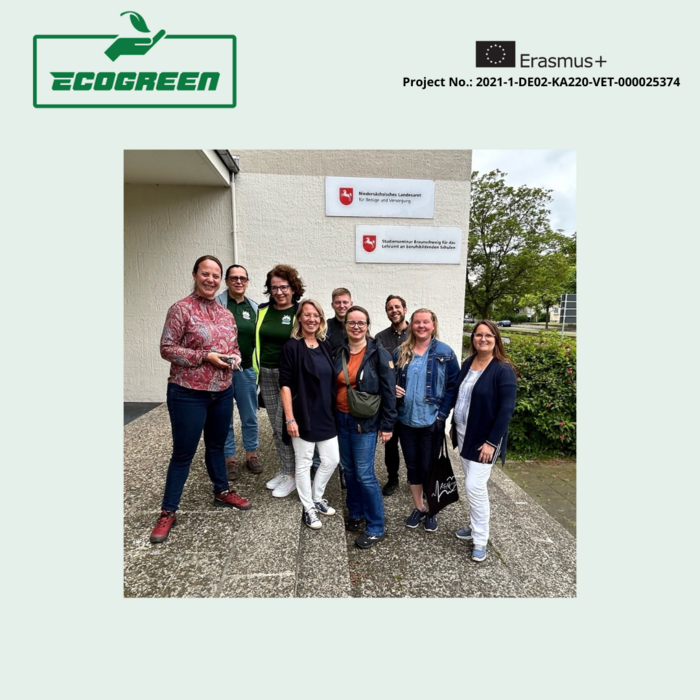

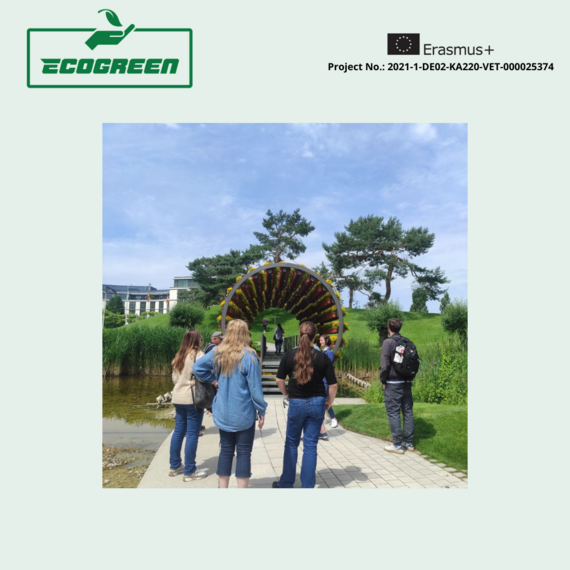
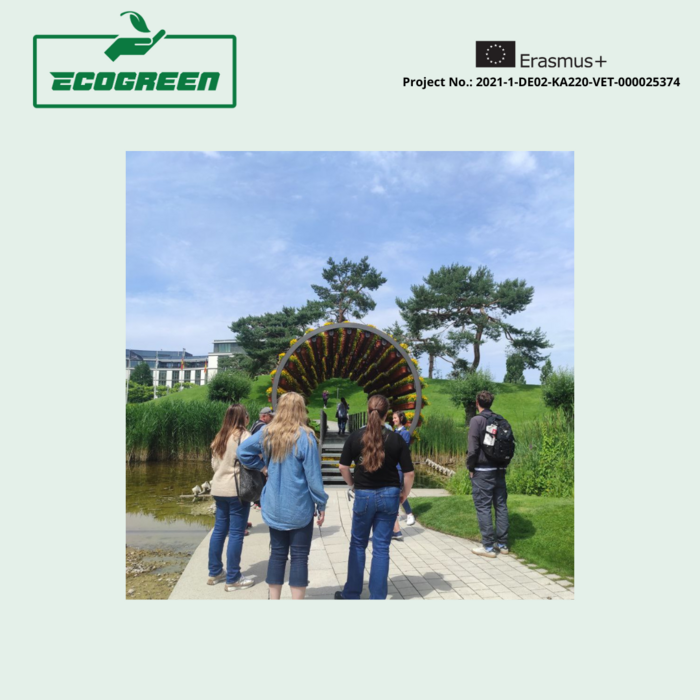

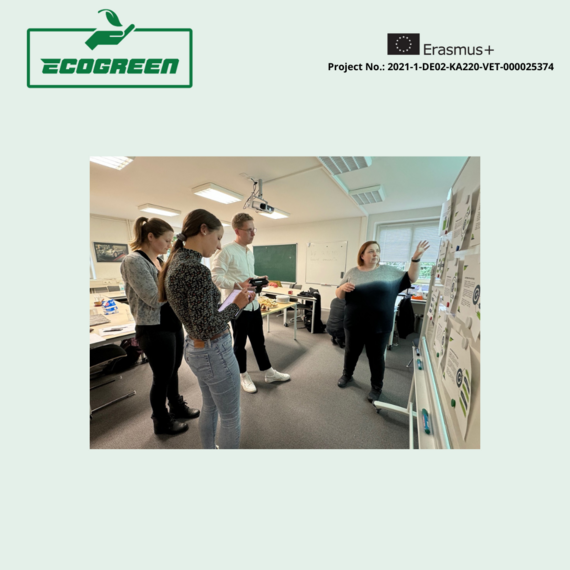
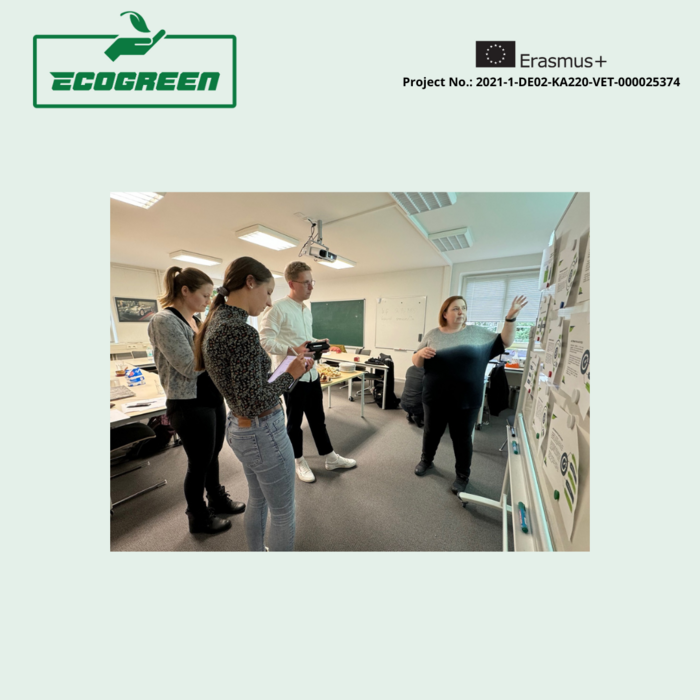

Project Meeting in Savonlinna
In September 2023, the EcoGreen consortium met in Savonlinna, Finland, for a partner meeting and the LTTA. Thank you to our partners SAMIedu vocational college for hosting us and organizing such a great program!
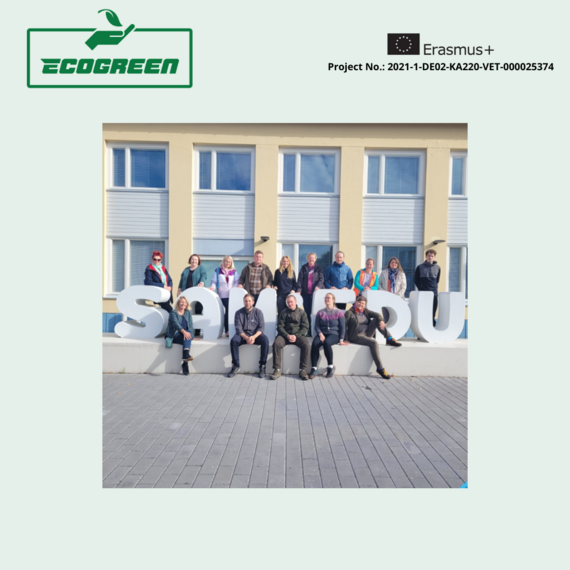
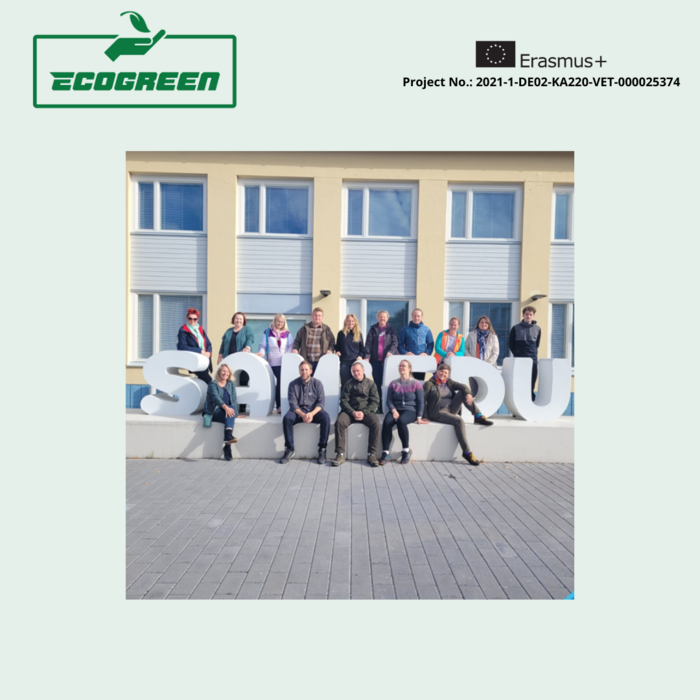

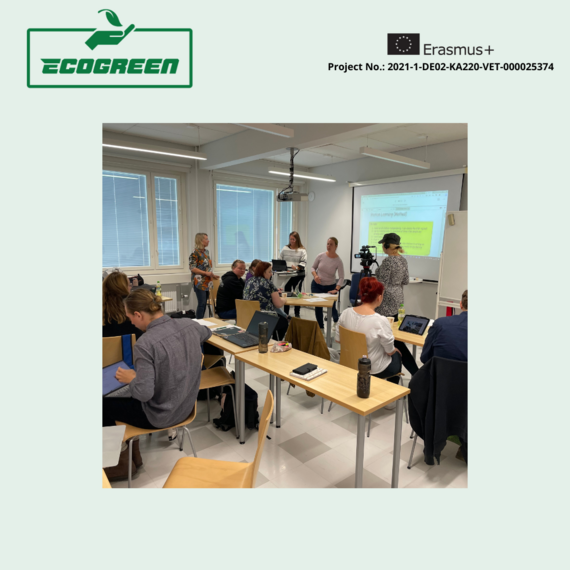
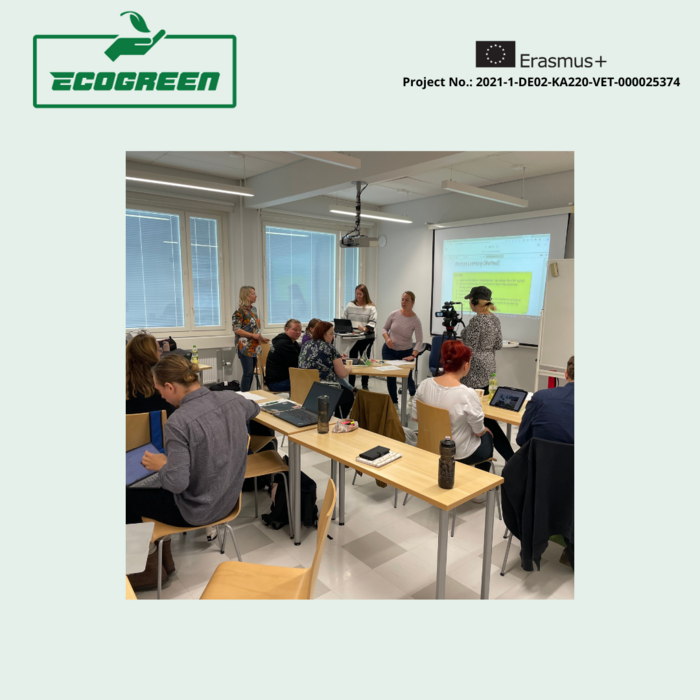

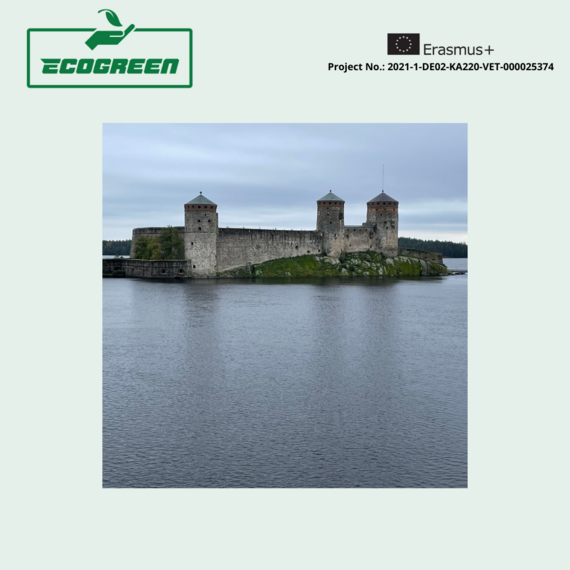


Project Meeting in Ruciane-Nida
Another partner meeting took place in June 2023. Our partner Zespół Szkół Leśnych (ZSL) hosted the consortium in Ruciane-Nida, Poland. Thank you for the productive meeting and the entertaining program!
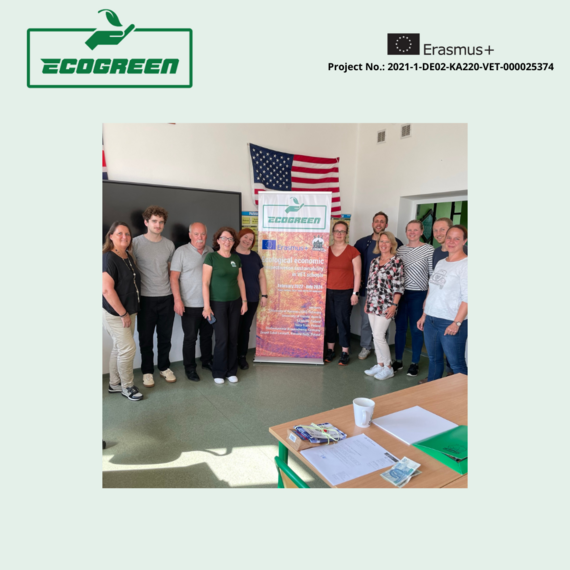
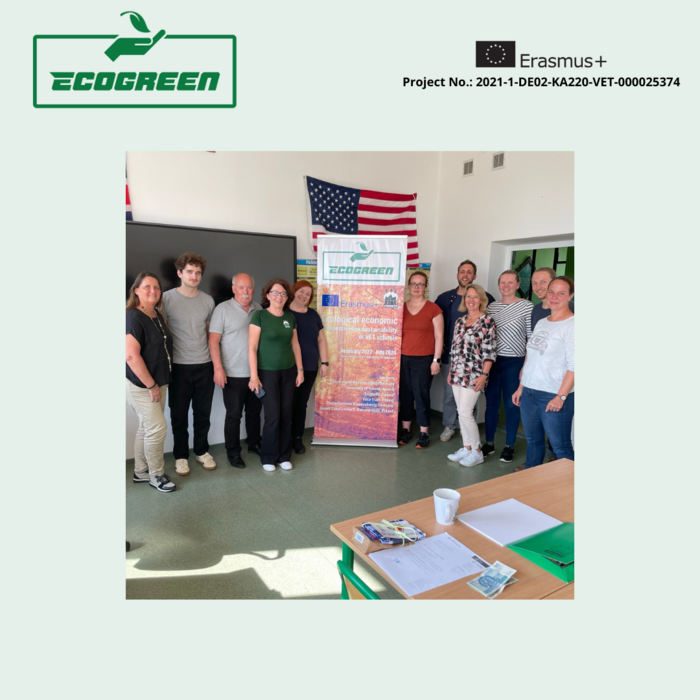
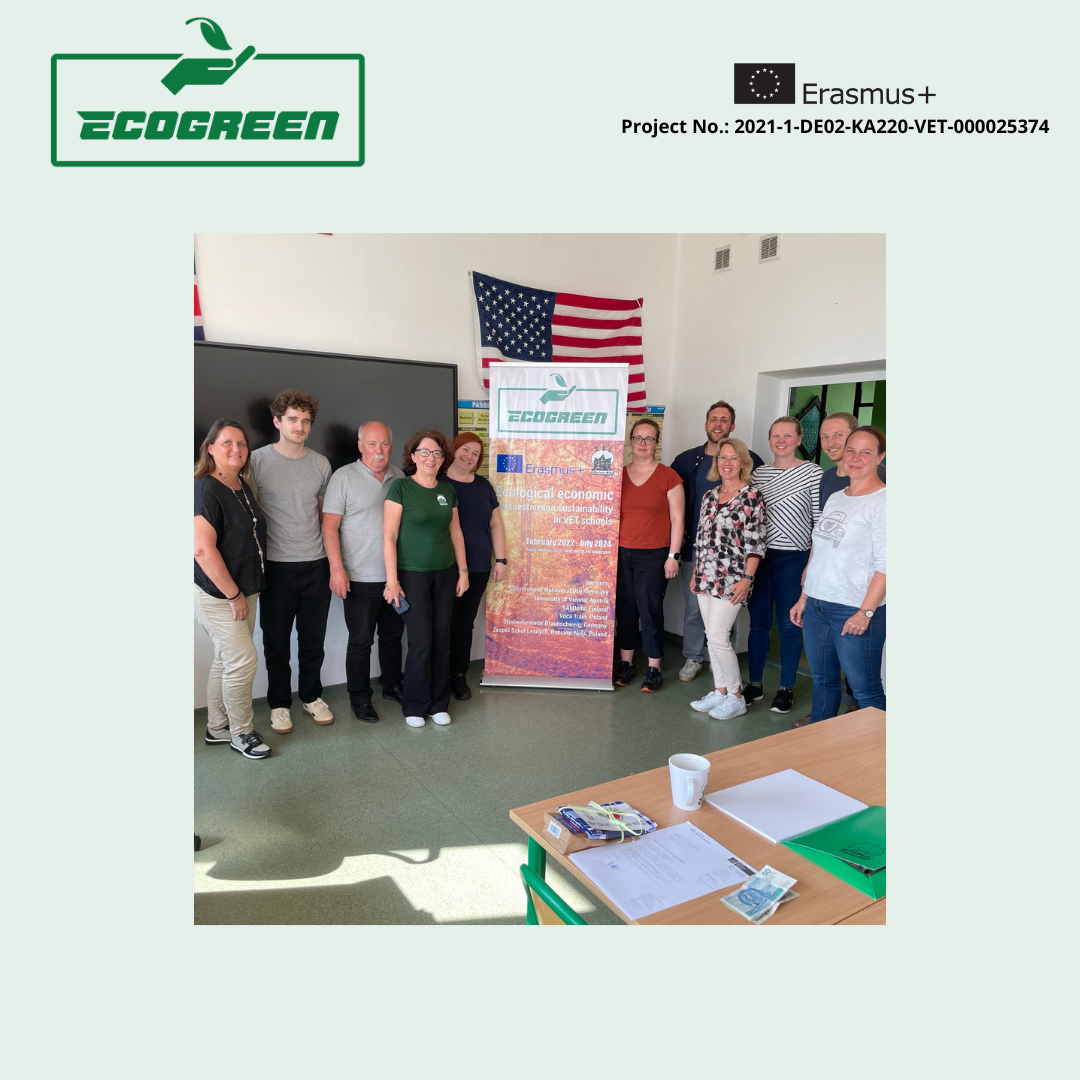
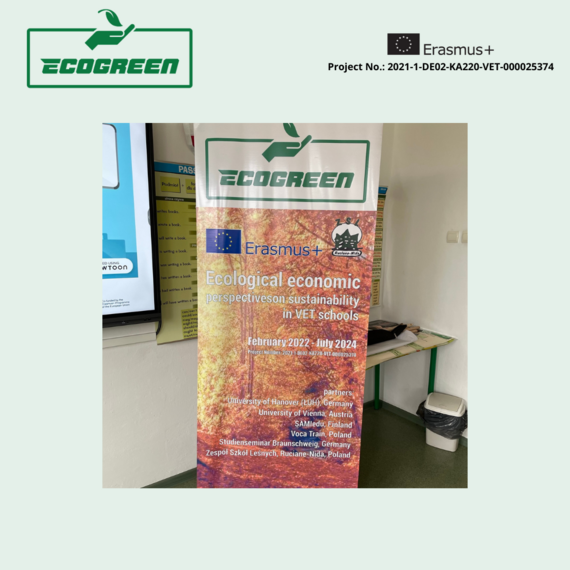
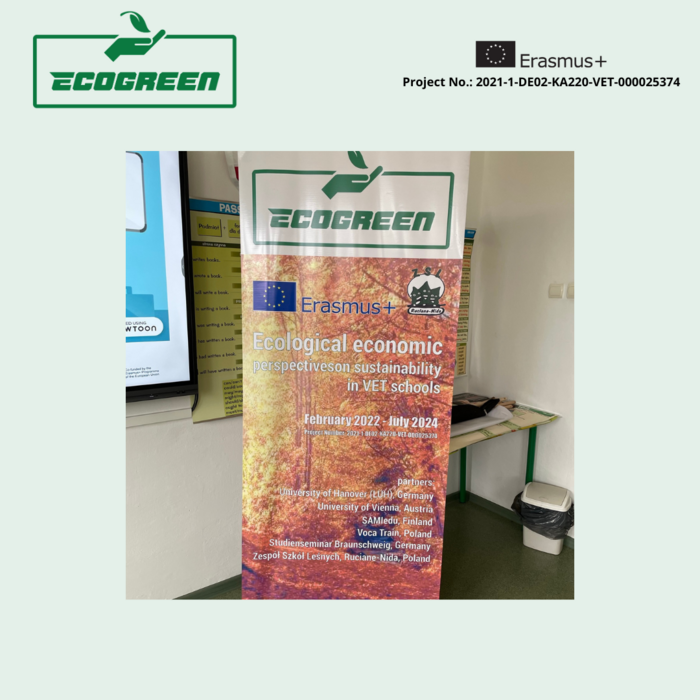
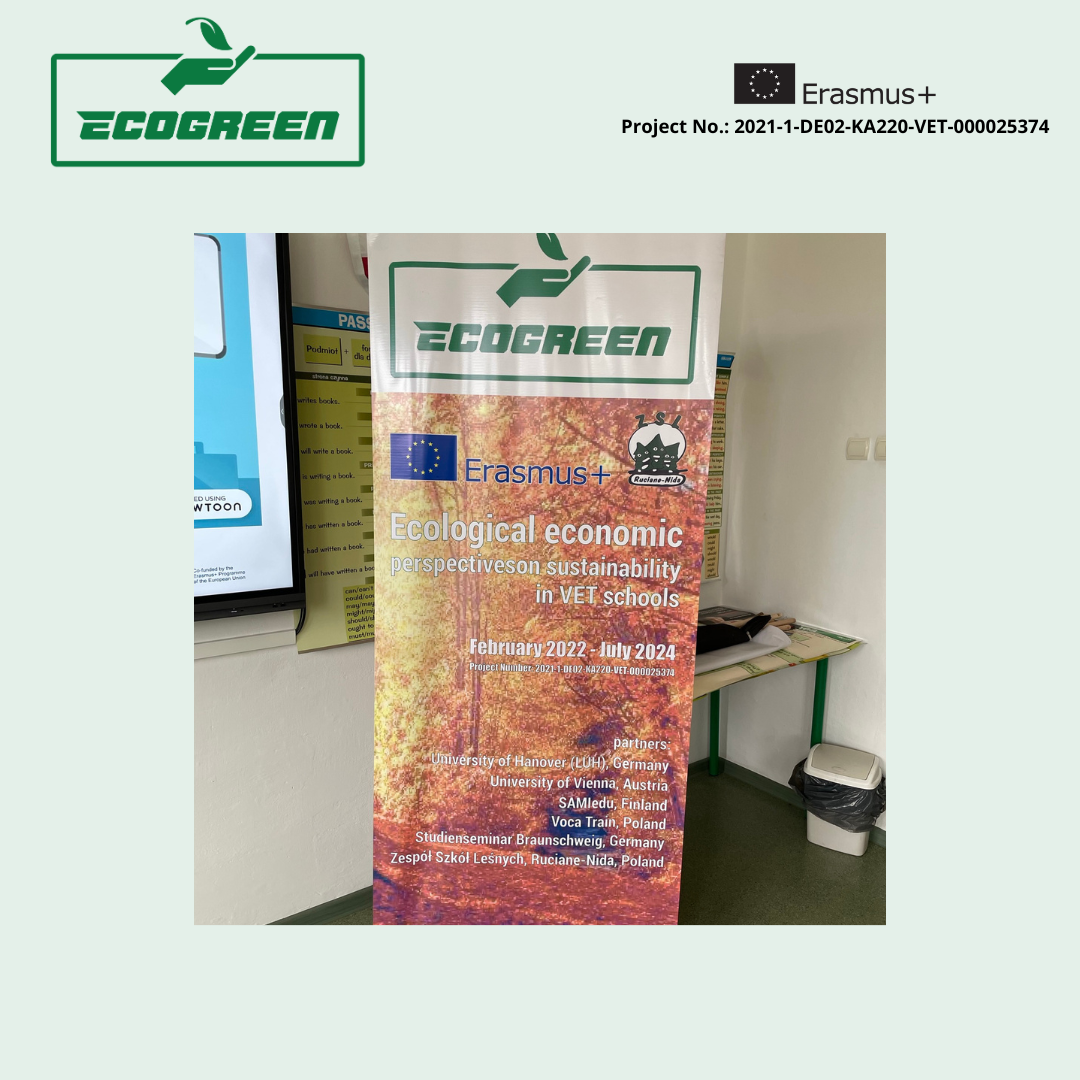
Projekt Meeting in Vienna
From 31.10.22 to 1.11.22 the team of EcoGreen came together in Vienna to work on the concepts for the handbook, the podcast episodes and the teaching material.
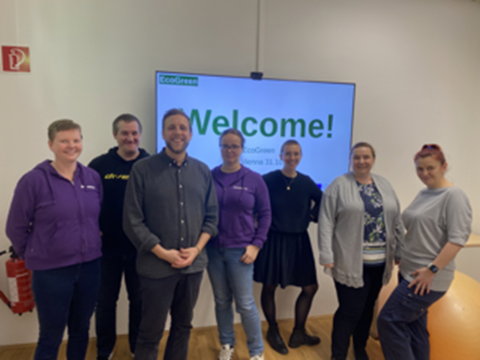


About us
Institute for Didactics of Democracy



The overall goal of the research group "AGORA Civic Education" as part of the "Institute for Didactics of Democracy" (IDD), is to enable both young people and adults to acquire key qualifications and competences necessary for active citizenship and participation at all levels of social and political life. The research group offers a wide range of teacher training courses and seminars covering all aspects of political education in teaching and learning. The courses are offered at university level as well as at national and European level.
Contact Person: Richard Heise (heise@idd.uni-hannover)
Website: https://www.idd.uni-hannover.de/de/institut/profil/
University of Vienna
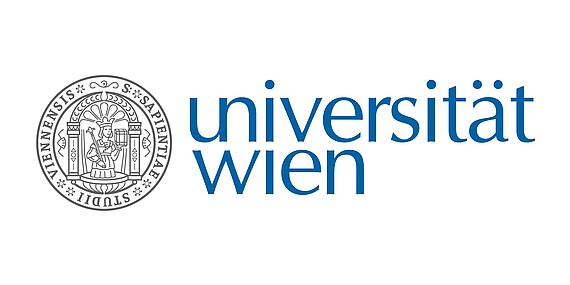
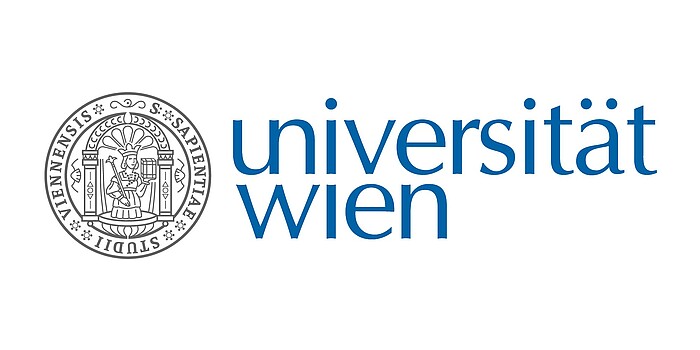
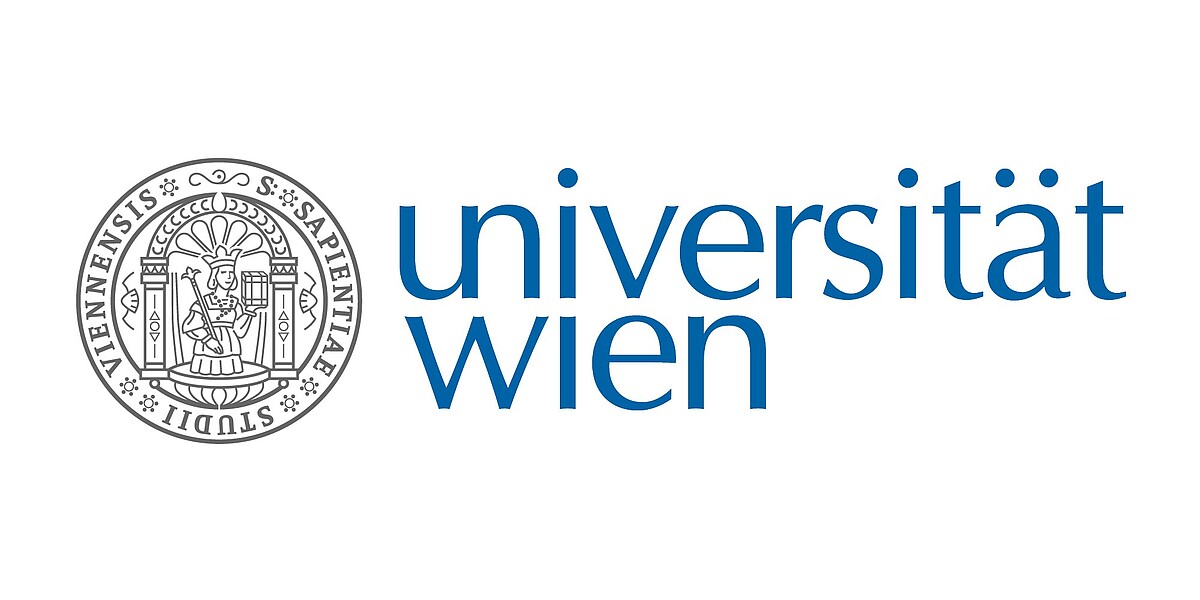
In the field of research, the University of Vienna is subdivided into 15 faculties and 5 centres. 49 directorates of studies and the Studienpräses (officer responsible for the implementation of the study law) are responsible for the organisation of courses. The research group of didactics of civic and citizenship education was established in March 2017 at the Centre for Teacher Education in order to strengthen civic and citizenship education within the education of teachers at the University of Vienna.
Contact Person: Johanna Taufner (johanna.taufner@univie.ac.at)
Website: https://www.univie.ac.at/
Itä-Savon koulutuskuntayhtymä
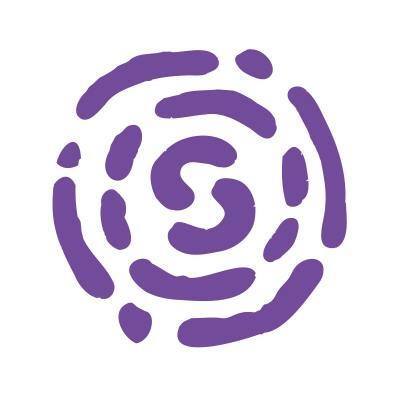


SAMIedu vocational college is a vocational college in the city of Savonlinna and is known as a high-quality educator and excellent coordinator and partner in educational development projects. The number of students in the school is about 1600, one third studies in vocational education, aged 16-60 years, for several basic professional qualifications, two thirds of the total number are adult students either in basic vocational education, in further or technical qualifications or in apprenticeship. Most of the students come from Savonlinna and the surrounding villages, a large number also from all over Finland. The total number of SAMI employees is 200. SAMIedu offers education and training in the following areas: social services, economy and administration, engineering and forestry and services.
Contact Person: Anne-Mari Behm (anne-Mari.behm@samiedu.fi)
Website: www.samiedu.fi
Pracownia Ksztalcenia Zawodowego "Voca Train" w Kolobrzegu



PRACOWNIA KSZTAŁCENIA ZAWODOWEGO "VOCA TRAIN" ZBIGNIEW SKWIERAWSKI w Kołobrzegu was founded on March 1, 2000 and is registered in the Central Register of Economic Activity (ceidg). Since the beginning of our activity, we have been preparing educational projects and carrying them out at the request of the applicants from the preparatory phase to the follow-up phase of the project. To date, we have prepared and implemented over 50 educational projects within the framework of Leonardo da Vinci, Youth, Socrates, Gruntvig, AGIS, ENEA, Erasmus+ and the Operational Programme Knowledge Formation Development (PO WER). We are currently implementing 3 KA101 projects for school teachers (language and method courses), 2 KA102 projects (international internships for vocational students) and 2 projects within the framework of transnational student mobility as part of the PO WER programme. Depending on requirements, we employ between 5 and 20 people. Our employees are specialists in certain areas and have extensive professional and training experience. We work with many primary, general and vocational schools in the region, organisations and associations as well as with local government institutions.
Contact Person: Maja Kowalczyk (myaka@interia.pl)
Website:
Zespol Szkol Lesnych
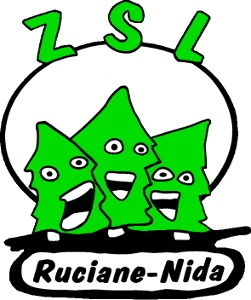


The Forestry School in Ruciane-Nida (ZSL) was founded in 1973. Since 01.09.2017 we have been working formally as an industrial center for vocational education and training under the name Forstschulkomplex. Teaching directions are forestry technicians, landscaping technicians, IT technicians, tourism service technicians, forestry machine operators, gardeners. We are a supra-regional school. We train the youth from the Warmian-Masurian Voivodeships, Podlaskie and Mazovia. We have a good didactic basis. We have specialist workshops for the professional subjects: forest protection, forest use, forestry, forest breeding, forestry and forest biology as well as well-equipped general education laboratories. We have three computer labs, a multimedia studio and a gym. We have a driving school for courses in the T-category (tractor) with full equipment and teaching staff. Most studios are equipped with modern audiovisual technology. The construction and equipment of the modern school workshops was completed two years ago. The didactic basis favors the use of modern teaching techniques and an efficient teaching and learning process. Interested students participate in literary, mathematical, athletic competitions (orienteering, shooting, archery, volleyball, chess), ecological competitions related to forest and hunting knowledge - which contributes significantly to the development of their interests and passions. Currently, our team consists of the technical school (9 branches - 223 students), dormitory (over 80% of the students). Students are 14-20 years old. For 3 years we have been conducting professional qualification courses for adults - our teachers establish good contacts with the students and their parents, at the same time they are characterized by high pedagogical effectiveness, helping their protégés to solve typical and unusual problems of adolescence. They are able to use different methods of work, they also use modern technologies.
Contact Person: Dorota Sokołowska (dorota.sokolowska@osaet.pl)
Website: http://zsl.org.pl/
Studienseminar Braunschweig für das Lehramt an berufsbildende Schulen
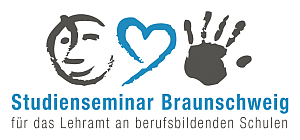


The StS BS LbS is the state-approved training institution responsible for the second phase of vocational school teacher training in the Braunschweig area. After completing their studies, prospective teachers at a teachers' college must complete an 18-month pedagogical-practical training course, which concludes with a second state examination and qualifies them for use at vocational schools. The university employs 35 specialists who train about 100 prospective teachers, including career changers, in various didactic and pedagogical areas. Professional specializations at the StS BS LbS are Applied Computer Science and Computer Science, Civil Engineering, Chemical Engineering, Wood Engineering, Mechanical Engineering and Interior Design, Food Sciences, Health Sciences, Nursing Sciences, Economics and Commerce, Social Education and Special Education. Subjects of general education at the StS BS LbS are biology, chemistry and physics, German, English and Spanish, religion and ethics, history, mathematics, sports and politics. Each profession and subject is organized in courses that follow a specific curriculum. In addition, the school offers extracurricular services in the areas of European and international education, integration of mobile digital devices into the classroom, experiential education, ERP systems and student coaching. The overarching guiding principles of the StS BS LbS are: Equipping the specialist rooms according to the requirements of modern pedagogy; regular participation in internal and external training events; Maintenance of a comprehensive educational offer in the Braunschweig area; Cooperation with regional, national and international actors, in particular taking into account the needs of vocational schools in the Braunschweig area; Optimisation of the work-life balance of our trainees through individual support and advice; Qualification of our trainees according to transparent expectations; Quality improvement through methodical measures in the sense of quality management.
Contact Person: Dunja Gremmelmaier (dunja.gremmelmaier@sts-bs-bbs.de)



This project has been funded with support from the European Commission. This communication reflects the views only of the author, and the Commission cannot be held responsible for any use which may be made of the information contained therein. Submission Number: 2021-1-DE02-KA220-VET-000025374 3.



EcoGreen is licensed under CC BY-SA 4.0.
To view a copy of this license, visit https://creativecommons.org/licenses/by-sa/4.0












